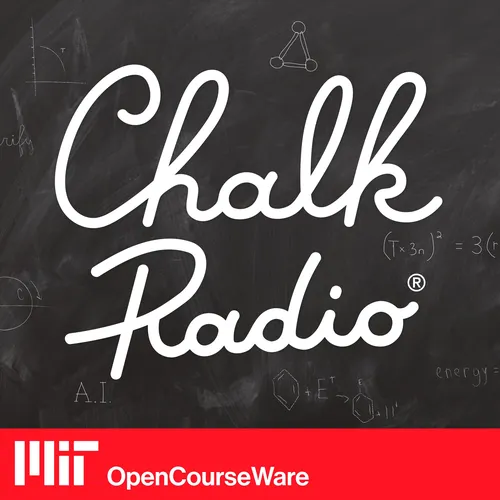
Chalk Radio
Chalk Radio is an MIT OpenCourseWare podcast about inspired teaching at MIT. We take you behind the scenes of some of the most interesting courses on campus to talk with the professors who make those courses possible.
Our guests open up to us about the passions that drive their cutting-edge research and innovative teaching, sharing stories that are candid, funny, serious, personal, and full of insights. Listening in on these conversations is like being right here with us in person under the MIT dome, talking with your favorite professors.
And because each of our guests shares teaching materials on OCW, it's easy to take a deeper dive into the topics that inspire you. If you're an educator, you can make these teaching materials your own because they're all openly-licensed.
Hosted by Dr. Sarah Hansen from MIT Open Learning.
Chalk Radio episodes are offered under a CC BY-NC-SA license (https://creativecommons.org/licenses/by-nc-sa/2.0/).
- Update frequency
- every 15 days
- Average duration
- 21 minutes
- Episodes
- 57
- Years Active
- 2020 - 2025

MIT Programmer Ana Bell on Growth Mindset, Coding, and Rubber Ducks
Learn about Python, growth mindset, and the uses of rubber ducks in this interview with MIT lecturer Ana Bell. Dr. Bell, who has been programming since she was twelve and now teaches popular introduc…

MIT Economist Andrew W. Lo on Finance, AI, and Human Behavior
In this the first of two pilot episodes of Chalk Radio with VIDEO, Professor Andrew Lo, who teaches finance at MIT’s Sloan School of Management, knows that many people find financial matters perplexi…

Sujood from Sudan: An Open Learner's Story
Sujood Khalid Eldouma recently relocated to the UK for her master’s studies, having previously lived in Egypt after fleeing her native Sudan to escape the devastating civil war in that country. Sujoo…

Jerry from Uganda: An Open Learner's Story
They say every crisis also presents an opportunity. Open learner Jerry Vance Anguzu seized one such opportunity in the midst of the Covid-19 pandemic, when his native country of Uganda went into lock…

Lotfullah from Afghanistan: An Open Learner's Story
Our guest for this episode, Lotfullah Andishmand, grew up in a village in rural Afghanistan where there was no internet access or electric lights. (He describes having had to navigate by moonlight to…

Nader from Jordan: An Open Learner's Story
When Nader AlEtaywi was in high school in Jordan, he had a passion for finance but his prospects seemed limited. Juggling his studies, minimum-wage jobs, and family crises made it hard to envision a …

Jae-Min from South Korea: An Open Learner’s Story
Jae-Min Hong, our guest for this episode, is a hungry learner with wide-ranging curiosity and a distrust of groupthink. A native of South Korea, she has been fluent in English from childhood, which h…

Maria from Brazil: An Open Learner’s Story
In this inaugural episode of the Open Learners podcast, hosts Emmanuel Kasigazi and Michael Jordan Pilgreen interview Maria Eduarda Barbosa, a medical student located in Rio de Janeiro, Brazil. Maria…

Introducing the Open Learners Podcast
Emmanuel Kasigazi is a data scientist from Kampala, Uganda. Michael Jordan Pilgreen is a financial technology engineer from Memphis, Tennessee. Kasigazi and Pilgreen know firsthand how transformative…

Living Poetry with Poet Joshua Bennett
This episode features a wide-ranging conversation about poetry: what it is, where it comes from, and why it matters. Our guest, poet (and poetry professor) Joshua Bennett, talks about the early exper…

Robust Science with Prof. Rebecca Saxe
Our guest for this episode, Professor Rebecca Saxe, is MIT’s Associate Dean of Science. Prof. Saxe is also the principal investigator for her own laboratory, the Saxe Lab, where she deploys powerful …

Innovation, Past and Future with Open Learning's Dean Christopher Capozzola
As MIT’s Senior Associate Dean for Open Learning, Christopher Capozzola’s job is to look forward, identifying new opportunities and facing new challenges in online and digital learning. But he’s also…

What’s Worth Making? with Prof. Hal Abelson
Professor Hal Abelson has been active in computer science for over half a century—the first computer he worked with, in high school, was the kind where programs were encoded in a pattern of holes pun…

Everything Here Is Sacred (Terrascope Radio Replay)
In a departure from our usual format, in which we interview an exceptional faculty member to learn about their approach to teaching, this time we’re showcasing an exemplary piece of student work: an …

The Power of Experience with Dr. Ari Epstein
You thought Chalk Radio was a podcast about inspired teaching at MIT? Yes and no! “We don't do a lot of teaching,” says Dr. Ari Epstein, our guest for this week’s episode. Dr. Epstein is associate di…

Economics and Real-World Impact with Dr. Sara Ellison and Prof. Esther Duflo
In this episode we meet professor and Nobel laureate Esther Duflo and her colleague Dr. Sara Ellison for a discussion about economics: what it is, how it differs from sociology, how it incorporates c…

The Lumpy Universe with Prof. David Kaiser
This conversation with Prof. David Kaiser, who teaches physics and the history of science at MIT, covers a vast timespan, from the beginning of the universe to the present day. Prof. Kaiser explains …

Reimagining Cities with Prof. David Hsu
Paradoxically, urban planning professor David Hsu doesn’t consider himself a “city person,” but he has great appreciation and enthusiasm for cities as places where meaningful steps can be taken towar…

The Kitchen Cloud Chamber with Prof. Anne White
You don’t need a multibillion-dollar supercollider to detect subatomic particles. In fact, you can build a working cloud chamber—a device capable of revealing the cosmic radiation and radon decay eve…

Honoring Your Native Language with Prof. Michel DeGraff
We first interviewed Professor Michel DeGraff back in season 1; he now returns for another episode, diving deeper into issues of culture and identity. He talks about his childhood in Haiti, where he …